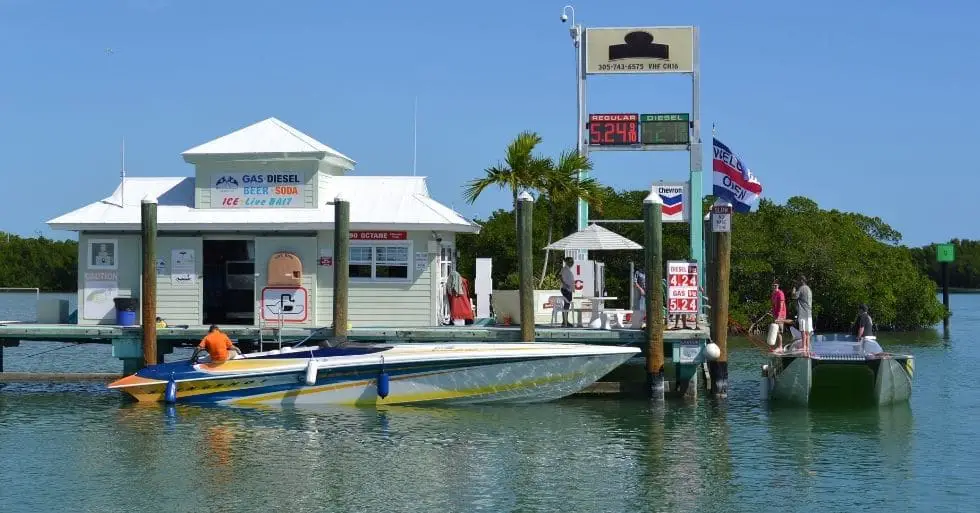Depending on your engine manufacturer and the region of the world you live in, the fuel requirements for your boat engine may differ. This is because fuel stations measure octane levels differently depending on your world region. However, below is a brief explanation of what fuel you should use in boats.
Most marine gasoline engine manufacturers recommend using ethanol-free or 10% ethanol gasoline with a minimum octane rating of 87 (a few sport engines require higher octane). Most marine diesel engine manufacturers recommend using off-road diesel (No. 1-D or No. 2-D).
Both 2-stroke and 4-stroke marine motors follow this rule.
Note: some commercial and large marine vessels such as barges may require bunker fuel. More on that here.
Never use gasoline that contains more than 10% ethanol for boat engines, such as E15 or E85 gas. However, if you don’t know exactly what your boat engine manual says about fuel ethanol rating, I recommend using 0% ethanol fuel. And if you do use 10% ethanol (E10) gas, I recommend using a fuel stabilizer and a water separator fuel filter to prevent corrosion, and other issues ethanol can cause. (click on links to go to the products on Amazon)
Note that many older engines require non-ethanol fuel, so always check your owner’s manual or look up information online, especially if your engine is old.
Minimum octane ratings depend on each specific boat motor (check your owner’s manual). Generally, the minimum octane rating is 87 (PON) in North America and 91 (RON) in Oceania. However, your specific motor may require a higher rating, especially if it’s meant for performance and if you’re using fuel with ethanol in it.
When you go to a fueling dock on the water, they’ll generally have 2 different types of fuel, unleaded gasoline (which is usually 87 octane non-ethanol) and diesel. You shouldn’t have to worry about fueling up with this fuel. Non-ethanol fuel generally means octane is irrelevant (as long as it’s 87 or higher), but very few sports motors such as muscle boat motors and seven marine outboards may require higher octane.
What Fuel should you use at an automotive gas station for a boat?
You will have to worry about what type of fuel you’re using when you fuel up at an automotive gas station. Some automotive gasoline types such as E15 and E85 will harm your marine engine. So, if you do fuel up at an automotive gas station, I recommend this:
Gasoline
For marine gasoline engines, non-ethanol gasoline (E0) will be the best, but sometimes that may not be available. If that’s the case, go with E5 or E10 (only if your owner’s manual says it’s okay to do so) and at least an 87 octane rating (performance engines may require higher octane). Then add a fuel stabilizer to the tank if you have any.
If you don’t have any fuel stabilizer, you can still run your engine with ethanol fuel. However, make sure you fill the tank up all the way so you don’t run into any water absorption problems with the ethanal. You should also put a fuel stabilizer (such as this one) in the fuel tank and run the engine as soon as possible.
Diesel
For marine diesel engines, use non-highway (red-dyed) diesel. Specifically, most manufacturers recommend No. 1-D and No. 2-D diesel (either should be fine). I also highly recommend treating diesel fuel with bacteria and fungi killing fuel additives because diesel tanks are known for attracting microbial.
Read more about bacteria growth in diesel engines by clicking here.
How to see what fuel your engine manufacturer recommends
If you look at your owner’s manual, the recommended fuel will be labeled on it somewhere. Look for “fuel requirements” in the table of contents.
If you want to see your owner’s manual online, you can check it out online. Below I’ve listed the links to find them depending on your manufacturer.
Why is high ethanol fuel (E15 and E85) bad for marine engines?
Ethanol is bad for marine engines because of whats knowns as “phase separation”. Phase separation happens when water enters your fuel and takes the ethanol out of the gasoline. When there are low amounts of ethanol in the gas, it causes the octane rating to drop. Low octane can severely damage engines and can even cause engine failure.
So this is why a water separator fuel filter such as this one and fuel stabilizer such as this one are recommended if you have ethanol in your fuel.
Because high ethanol fuels such as E15 and E85 have such high levels of ethanol, phase separation can be much worse if the fuel were in contact with water. And since boats are on the water, it’s pretty difficult to avoid getting any water in the fuel tank.
Even if you have a water separator fuel filter, water can still get in your fuel because of condensation. So to avoid this causing any problems, never put any fuel in your boat that has higher than 10% ethanol (E10). Even E10 fuel can be risky if it’s low octane and you don’t have a water separator or fuel stabilizer.
So getting non-ethanol or premium E10 fuel is the best fuel for boats. This way, you shouldn’t have to worry much about phase separation. And if it did happen, the high octane rating of premium fuel would mostly offset it.
What octane rating should you use for your boat motor?
I know I’ve already talked about octane ratings in this article, but the answer for what octane you should use for your boat is it varies. Many people may say that a high octane rating is basically a waste of money. Still, there are some benefits to a high octane rating for marine engines, such as resistance to phase separation in ethanol gasoline.
Most boat engines need regular fuel with a minimum octane rating of 87 in America (91 RON for the rest of the world). However, if you use fuel with ethanol in it and you aren’t using a fuel stabilizer or water separator filter, you may want to get premium gasoline with a 90 octane rating or higher.
The reason you’d want premium fuel is that if your ethanol were to phase out if any water got in your tank, the octane rating would drop. And if the octane rating is already high because of premium fuel, you don’t have to worry too much about it harming your engine.
Along with that, few engines require premium gasoline. These are usually performance engines such as performance jet skis and seven marine outboards. So if you have a high horsepower motor, check your owner’s manual to make sure you’re using the correct octane rated fuel.
Best fuel stabilizers you should get
As I’ve mentioned above, if your using any ethanol in your boat fuel, I recommend getting fuel stabilizers. Fuels stabilizers will help prevent the damage that ethanol can cause your marine engine. So here are my recommended fuel stabilizers:
- Best for when you’re using your boat: STA-BIL 360 Marine
- Best for when you’re storing your boat: STA-BIL Storage
These stabilizers can get pricy, so I recommend buying the gallon option to save some money in the long run.
Should you get fuel from a marina or a gas station?
It’s usually recommended to fuel your boat up at a gas station instead of at a marina. This is because it’s cheaper and the fuel is generally much newer and better stored. Marinas are known for having low fuel quality because many times the fuel is very old.
Marinas generally charge about $0.5-$1.5 per gallon more for gasoline and $0.25 more for diesel. I know not everyone can get their boats to a gas station, but you could use a large gas can such as this one to fill up at a gas station and bring it to your boat.
Learn more about this by checking out this article here.
What fuel do commercial and large marine vessels use?
Some marine engines for very large and commercial vessels (such as barge ships) may require a unique fuel known as bunker fuel. There are 3 types of bunker fuel including heavy fuel oil (HFO), marine gas oil (MGO), and marine diesel oil (MDO). However, it would be very unlikely that your engine would require these fuel types.
(source)
Bunker fuel is known for being very pollutant because of its high amounts of sulfur. However, a recent law was passed in 2020 that limits the amount of sulfur used in bunker fuels, drastically cutting down immissions. Read more about this by clicking here.
FAQ
Yes, you can use ethanol fuel for most gasoline boat engines, but it’s never recommended to use anything higher than 10% ethanol gasoline (E10). So E15 and E85 gasoline are not recommended for marine use. I also recommend using a fuel stabilizer if you do put any ethanol in your tank. However, make sure to always check your owner manual to make sure your specific engine accepts ethanol.
Yes, you can use gas station fuel for boats, but make sure you never use fuel with more than 10% ethanol. Most marine engines recommend an octane rating of 87, but it may be higher if you have a performance motor. Marine diesel engines can be filled up with off-road (red-dyed) diesel.
Premium gas usually doesn’t provide any benefit to boat engines; however, some sport engines such as seven marine outboards may require premium gas. Besides that, unless you’re storing your boat for a while (where the octane could drop), you don’t need to use premium gas.
Yes, you can use regular gas with a minimum octane rating of 87 (91 RON) for boats. Most marinas have a non-ethanol version of regular gas. If you use regular gasoline from a gas station, I recommend adding a fuel stabilizer to prevent any problems due to the ethanol.
Yes, boats and cars use the same gas, but boats generally use gas with little to no ethanol. This is because if ethanol becomes contaminated by water, it could cause the fuel to drop in octane rating and damage marine engines. However, most gas stations have E10 fuel which is capable for use in both cars and boats.
If you don’t want to risk anything by using E10 fuel, most marinas will have ethanol-free fuel to use. Otherwise, go to pure-gas.org and find a gas station near you that carries ethanol-free (E0) fuel.
When you fuel up at a fuel dock, the octane rating is usually 87 and usually is ethanol-free (although some marinas do have ethanol in their fuel). Some marinas are adding 90 and 93 octane fuel to their stations due to some performance marine engines needing the higher octane.
Yes, you can put red diesel (off-road diesel) for marine vessels. Offroad diesel is cheaper because you don’t have to pay any road taxes on it.
Most jet skis require regular gas with a minimum octane rating of 87 (RON octane 91). However, some performance models such as Sea-Doo RXP-X 300 require premium fuel with a minimum octane rating of 92 (RON octane 95). Also, make sure to never put any gasoline with more than 10% ethanol (E10) in any marine vessel.
- What Is The Cheapest Way To Store A Boat? - February 28, 2023
- Do Boats Need Bottom Paint? (Uncovering the Truth) - February 2, 2023
- How Much Is Bass Boat Insurance? (Real Quotes) - January 18, 2023

